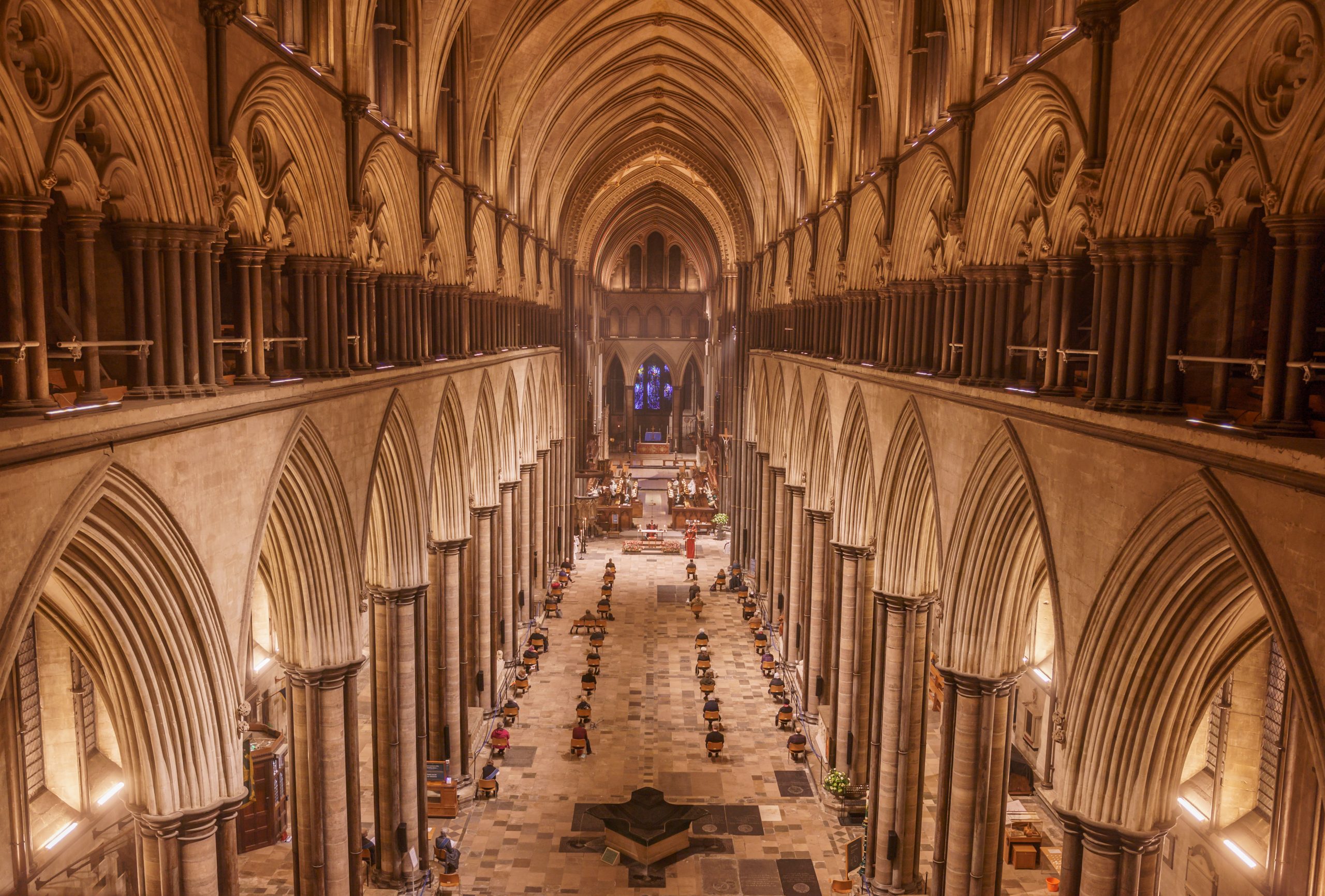30th January 2022
Theology

A sermon preached by Canon Edward Probert, Chancellor
Sunday 30 January 2022, The Fourth Sunday of Epiphany
(Ezekiel 43.27-44.4; Luke 2.22-49)
Please scroll to the bottom of this page for a video of this sermon
I went to theological college – a place dedicated to training potential priests for their ministry –in the 1980s, in a place that began life in the mid-19th century as part of what was known as the Oxford movement; a movement which aimed to reverse-engineer into the Church of England much of the medieval tradition and theology which had been pushed out in the intervening centuries, during the Reformation and the Enlightenment. That underlying sense of the importance of tradition, of the ease with which important things can be lost, was even to be found – in those days before plumbing – on the base of the college chamber pots, on which was written the motto: ‘Guard the deposit’.
Religions are indeed based around the habit of passing on what they hold in common, the beliefs, habits, and traditions they have received. Hence we read the traditions which are captured in Scripture; hence we have liturgies which repeat, using again and again phrases and music and patterns of behaviour – standing up, sitting down, kneeling, and other things that can be learned. We are indeed guarding the deposit, and religion is expressed at least as much in its common behaviour as it is in its intellectual beliefs; in the broadest sense of the word, there is a culture to be learned, so that what has been inherited can be passed on.
But this innate conservatism in religion is always in tension with the facts of life. Life is change – as that once familiar hymn ‘Abide with me’ put it before the song faded from use, ‘Change and decay in all around I see’. We may go on using the same words and phrases, but they won’t necessarily be heard in the same way as once they were.
That’s self-evident in reading texts from the last few centuries. If you or I were to have the invigorating experience of meeting Chaucer’s earthy Wife of Bath, we might just have made sense of each other, but it would be a struggle. There was a fascinating programme on Radio 4 yesterday about the great Irish writer James Joyce, in the centenary of his masterwork ‘Ulysses’; at one point an academic talked about teaching it to modern Irish students, and pointed out that these are sceptical about the ways Joyce represents male and female sexuality, rather than excited by this as were their predecessors. Irish culture has changed in countless ways in just 100 years.
Today’s scriptural deposits have brought us an impenetrable passage from the prophet Ezekiel, and a much more accessible short narrative from Luke’s account of the infancy of Christ. People familiar with our Church traditions will have noted the speech of Simeon as the source of the Evensong canticle ‘Nunc Dimittis’; the nerdy liturgists will have recognised the whole passage as the basis for the Feast of Candlemas, which falls this Wednesday. But what stands out for me in 2022 is a sentence which in the past I’ve largely ignored as merely incidental: Mary and Joseph, we are told, ‘offered a sacrifice …. a pair of turtle-doves or two young pigeons’.
Animal sacrifice was normal in the ancient world; altars were places for priests to kill things, temples ran with blood, and around the Roman empire the resultant meat could be bought in the markets. Parts of Paul’s letters address the question faced by Christians, whether it was ethical to eat meat sacrificed to pagan gods.
In England in 2022 AD, as opposed to Corinth in 50, our moral challenge isn’t the focus of a sacrifice, because that whole tradition is now completely unknown to us, and we don’t get agitated about the worship of Zeus and Artemis; but what may well seem unacceptable is the attitude to animal life, and animal death, which underlies this scene in the temple. The moral challenges of our day, like the politics of our day, like the language of our day, are not those of the past; all these things are in constant flux, because they are part of life.
Candlemas sits naturally during the Epiphany, because Simeon’s description of Jesus as ‘a light for revelation to the gentiles’ sums up this season. Revealing the life-giving truth of God in Christ is what it’s all about, and it’s our task as individuals and as a Church to be part of that process, passing on that wonderful illumination to those who barely perceive it. But guarding this deposit can’t be a squirreling away of what we’ve received, a protection of endangered tradition. It inevitably draws us into an engagement with the shifting cultures which surround us, welcoming the challenges to our inherited assumptions and patterns of behaviour, because change and decay really are part of the natural order of things. It is God who – in the hymn-writer’s phrase – ‘changest not’, and not the ways in which we serve him. He does and will abide with us, while we live in his ever-changing world.




